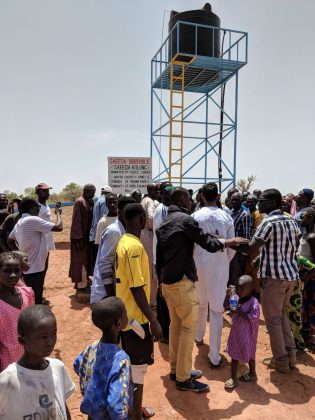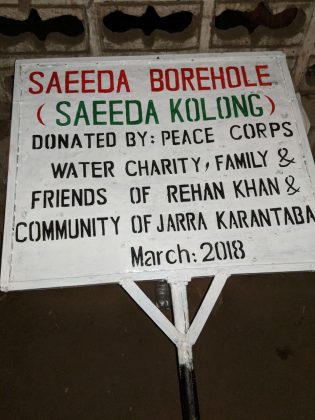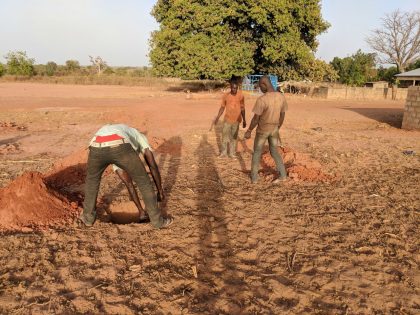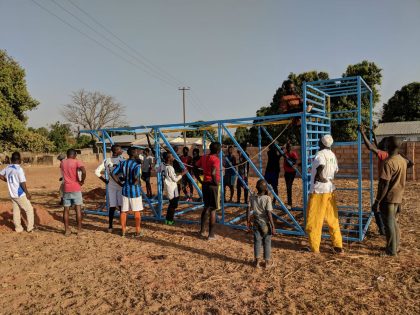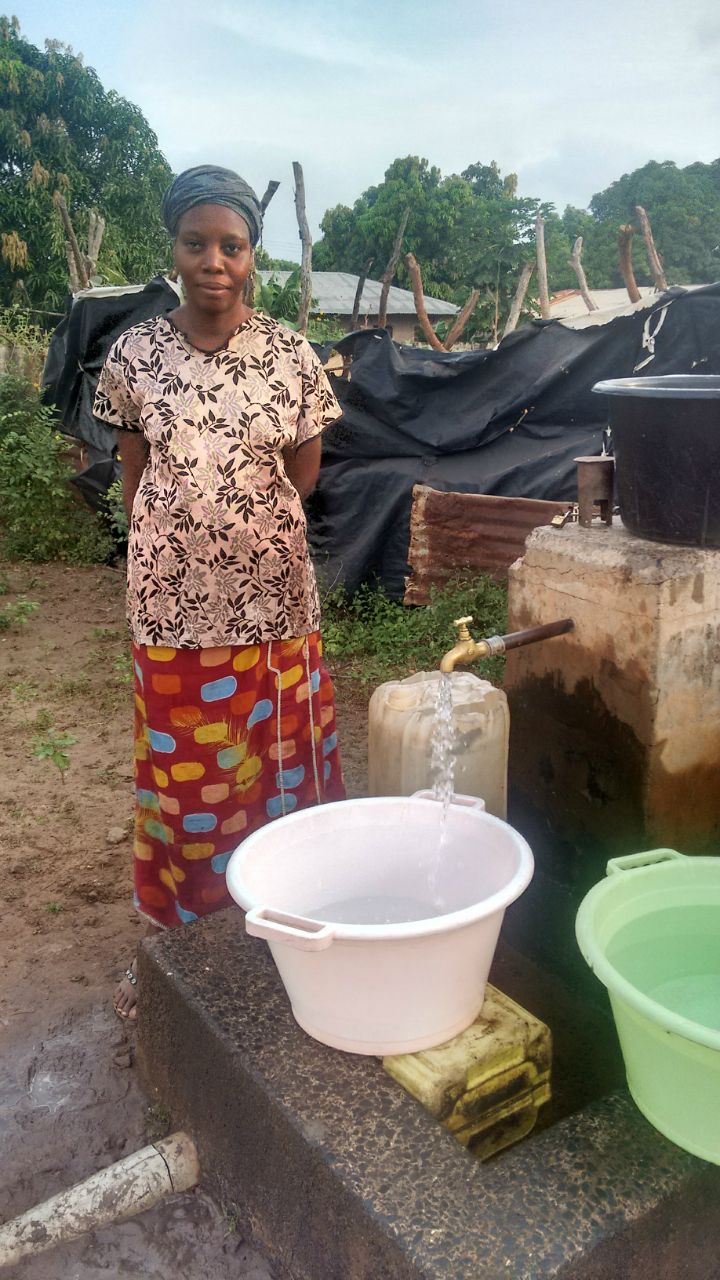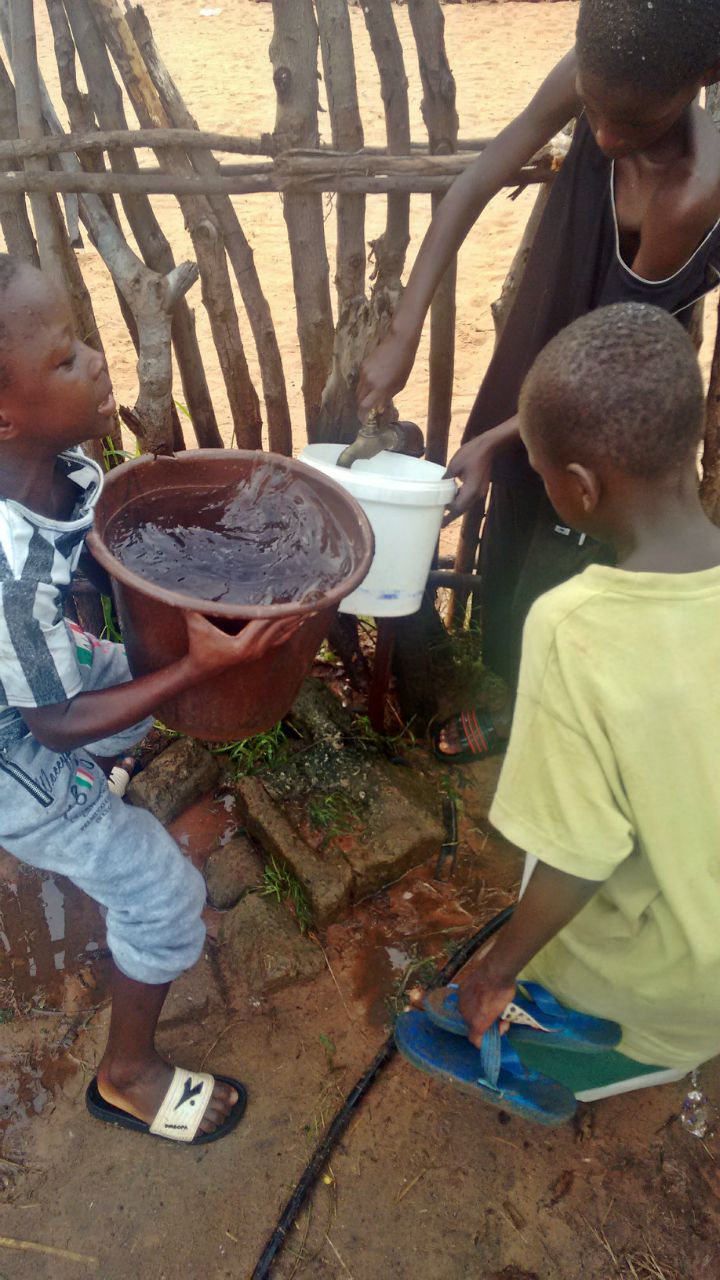This project is made possible through the partnership of WATER CHARITY and the NATIONAL PEACE CORPS ASSOCIATION. ![]()
This project has been completed. Scroll down to read about the conclusion.
Location
This project summary has been redacted for security reasons to omit the specific project location.
Kxxxxxxxx, Jarra West, The Gambia
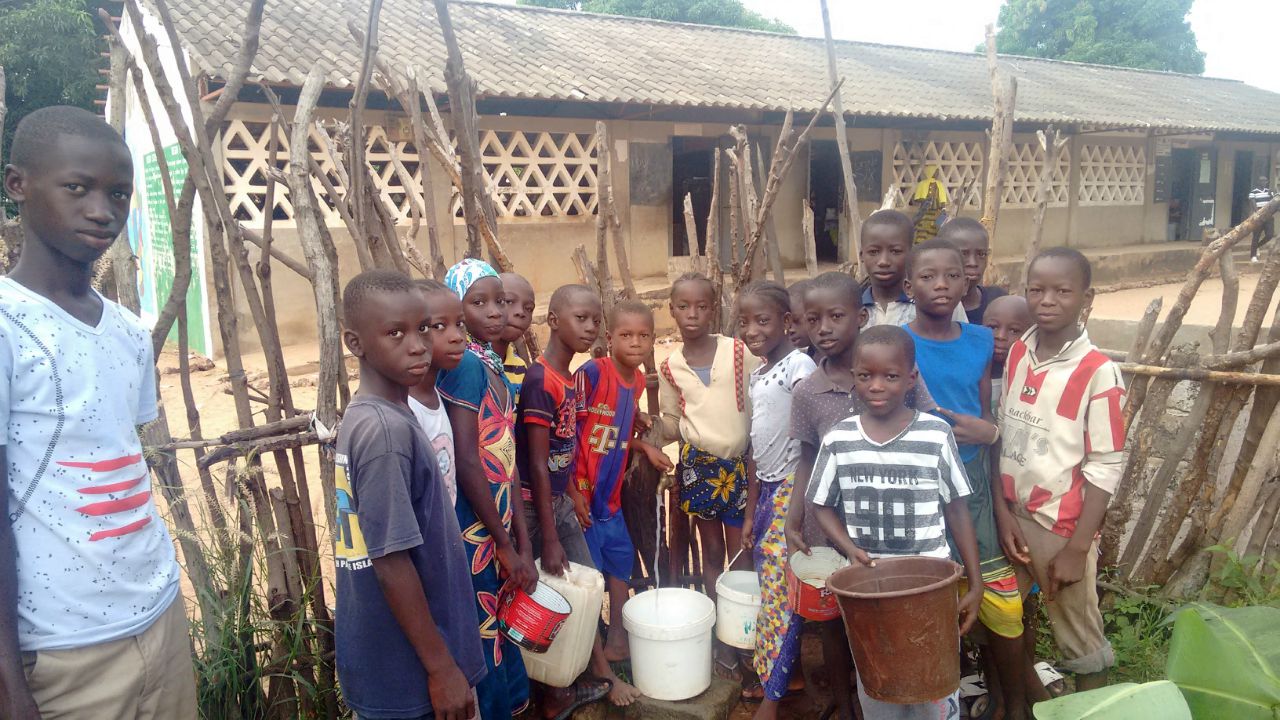 Community Description
Community Description
Jarra Kxxxxxxxx is an ethnically Mandinka village in the Lower River Region of The Gambia. The population of the village is ~1,200 people. There are 52 compounds total in the village, and that number is on the rise.
The village also houses a Lower Basic School, where many young school children attend daily to learn. Around 300 students from ages 4 to 12 attend this school.
Problem Addressed
Kxxxxxxxx’s water source is powered by a Government powered grid system, which is extremely inconsistent. In theory, this tap-system is supposed to provide water to the village in the mornings and evenings. Unfortunately, this is nowhere near the case with the village’s tap- system.
The village has gone without water for over two weeks on multiple occasions. This event leads to a course of unfortunate events, including students leaving school early due to lack of water, and people drinking from uncovered wells, which leads to increased cases of diarrhea throughout the community.
With the implementation of this project, the hope is that the village community won’t worry about where to go when there is no water available in the village. In addition, kids will no longer be sent home early and miss class because they have no access to such a vital component of life, such as water.
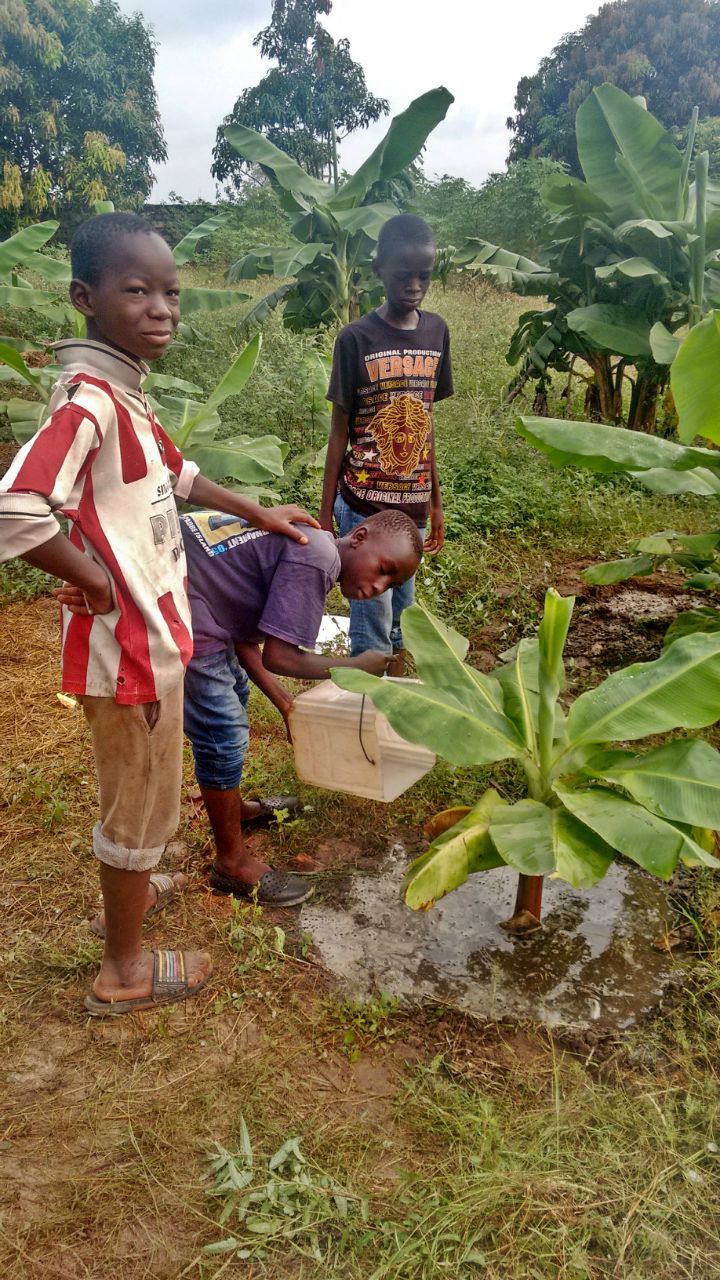 Project Description
Project Description
The project will be to erect and install a solar-powered 4½” x 25-40m borehole system within the village of Kxxxxxxxx. Upon completion, the water system will include a borehole well, 3 taps at major junctions throughout the community, 4 solar panels, and one 4,000L water tank. This will provide clean water to all the compounds in the village, as well as to Kxxxxxxxx’s Lower Basic School students.
By installing a solar-powered tap system, it ensures that even when electricity doesn’t come villagers can still gain access to a clean source of water and students in Kxxxxxxxx don’t have to leave school due to the lack of clean water. Every human being should have consistent access to clean water, as it is so essential to daily life all over the world.
A contractor from the capital city named, Water Point will be responsible for this contract. They will be called upon to drill the well, install the borehole and erect the solar panels and tank system.
Water Charity funds will be used for labor, materials, supplies, and transportation.
The villagers in Jarra Kxxxxxxxx plan on investing heavily in the success of this project. First of all, they will raise a portion of the money for the project on their own. In addition, many of the villagers will assist in the labor. Many have experience working with concrete, plumbing and electrical work.
In addition, the villagers will form a water committee, which will work to raise a water fund to ensure money in case the pump needs repairs in the future.
Project Impact
1,200 people will benefit from the project.
Peace Corps Volunteer Directing Project
Rehan Khan
Monitoring and Maintenance
The community is heavily invested into making sure this project stays around for a very long time. To ensure sustainability, first the community and the PCV will get together to create a water committee. The tasks of this water committee will be straightforward. Firstly, the committee will collect monthly fees from the village for potential maintenance costs. In case something does happen they will have funds to replace faulty parts.
In addition, they have plumbers that will be part of the water committee and fix things that may possibly need fixing. This water committee will also be involved in trainings about water hygiene, proper pump usage and fiscal responsibility of the funds collected each month. They will enhance the management practices as well as ensure the sustainability of the project beyond the project lifecycle.
The capacities built during the project implementation of the counterparts and community members will also contribute to the sustainability of the project.
Comments
This project will lead to the following benefits: (I) Increasing clean water availability to the villagers of Jarra Kxxxxxxxx (II) Higher rates of school attendants for girls and boys due to access of clean water, which should decrease rates of diarrhea. (III) Increase the income of the families because of fewer workdays missed due to sickness and money spent on medication. (IV) Decrease the chance of children crossing the main highway to fetch water and potentially being hit by vehicles.
Let Girls Learn
This project is a Let Girls Learn project, and it will directly have an effect on girls staying in school. As previously mentioned, when water is not available at the school, all the children are sent home early from school. 48% of the students at the school are indeed female. The previous term, students missed over two weeks of coursework solely because the water was not available in the school. These numbers are very disheartening as the availability of water should never be a variable that keeps students out of school. With the installation of this water system, we have full confidence that next term the students of Kxxxxxxxx Lower Basic School will miss no school days due to lack of water.
Project Funding
This project has been funded by an anonymous donor.
Conclusion of Solar-Powered Borehole and Water System Project – The Gambia
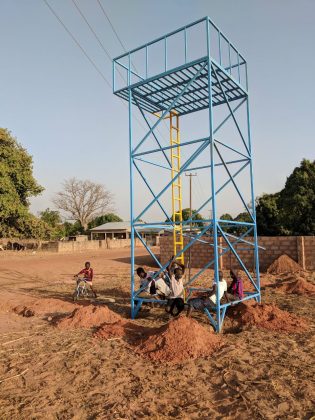 This project has been completed under the direction of Peace Corps Volunteer Rehan Khan. To read about the start of the project, CLICK HERE.
This project has been completed under the direction of Peace Corps Volunteer Rehan Khan. To read about the start of the project, CLICK HERE.
The project was designed to erect and install a solar-powered borehole, piping system, taps and tank.
Rehan reports:
Jarra Karantaba is a small village in the middle of a small West African country called, The Gambia. The village water source is powered by a Government electrical grid system, which is extremely inconsistent. In theory, this tap-system is supposed to provide water to the village in the mornings and evenings. Unfortunately, this is nowhere near the case with the village’s tap-system. The village has gone without water for over two weeks on multiple occasions, and as time goes on the local taps continue to be more inconsistent. Lack of consistent access to clean water leads to a course of unfortunate events including, students leaving school early due to lack of water, and people drinking from uncovered wells, which leads to vulnerability of a number of water-borne diseases (such as diarrhea), throughout the community.
With assistance from the United States Peace Corps and Water Charity, the project proposed included the erection and installation of a solar-power 4 ½ x 25-40m borehole system within the village of Karantaba. With the collaboration of a local contractor, Water Point, the project was successfully completed in March 2019. The full system included a borehole well, 3 taps at different junctions through the community (including one strategically placed at the lower basic school), 4 solar panels, and one 4,000L water tank.
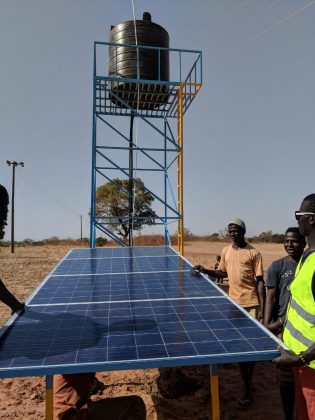 Construction for the project began in February with the arrival of Water Point’s drilling team. Following the completion of the drilling, the local community also chipped in their own hard work through the digging of the trenches for all the pipes that were to be laid throughout the village. Approximately 50 villagers showed up to assist in digging. The first pipes that were dug and laid down were that of Karantaba’s Lower Basic School. Many of the local women also helped out by providing food every day for all the contractors that were helping with the construction of the borehole.
Construction for the project began in February with the arrival of Water Point’s drilling team. Following the completion of the drilling, the local community also chipped in their own hard work through the digging of the trenches for all the pipes that were to be laid throughout the village. Approximately 50 villagers showed up to assist in digging. The first pipes that were dug and laid down were that of Karantaba’s Lower Basic School. Many of the local women also helped out by providing food every day for all the contractors that were helping with the construction of the borehole.
The work contracted by Water Point was completed in early March 2018. Upon completion of the contracted work, one tap was fully functional inside of the lower basic school, a second tap was erected close to the borehole, and the third and final tap was placed on the other side of the school at a junction close to many local households.
In mid-March 2018, the village raised enough money to purchase supplies for an additional tap to be placed close to another high traffic area of the village that included access to the local mosque, as well as a very large number of local compounds. The fundraising and construction for this last tap came completely from within the village. The village raised a little over 20,000 dalasi (~$400), which allowed them to purchase piping, tap heads, concrete, and other relevant installation supplies, in addition to fencing materials to secure the area where the solar panels and tank are located. Local plumbers from the village helped oversee the final stage of the project to ensure that everything was excavated and installed properly. A few local handymen also helped put up a chain-link fence and installed a door to keep the borehole secure from potential thieves.
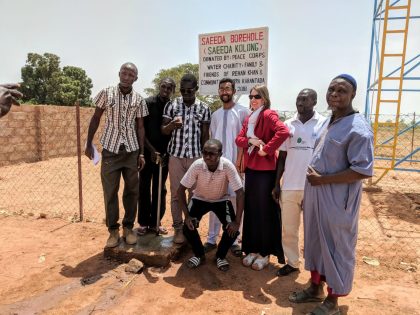 To ensure the proper sustainability of the project, the Peace Corps Volunteer, Rehan Khan and the village community came together to create a water committee to oversee and maintain the borehole. Six different trusted local villagers were given different positions including, a Secretary, 2 Local Water Committee Plumbers, a Treasurer, a Water Committee Head and a Water Committee Woman’s Rep. A borehole usage system was also implemented for all the taps to ensure thorough management, and ensured the longevity of the borehole. The system implemented requires that all of the borehole’s tap heads be locked at all times. If a villager is in need of water they will go to the compound of a local key-holder (whom are conveniently located in compounds near the tap heads with a key).
To ensure the proper sustainability of the project, the Peace Corps Volunteer, Rehan Khan and the village community came together to create a water committee to oversee and maintain the borehole. Six different trusted local villagers were given different positions including, a Secretary, 2 Local Water Committee Plumbers, a Treasurer, a Water Committee Head and a Water Committee Woman’s Rep. A borehole usage system was also implemented for all the taps to ensure thorough management, and ensured the longevity of the borehole. The system implemented requires that all of the borehole’s tap heads be locked at all times. If a villager is in need of water they will go to the compound of a local key-holder (whom are conveniently located in compounds near the tap heads with a key).
For each large empty pan or bottle, one must pay one dalasi to the key holder for each item they would like filled. For instance, if a villager has 5 large bottles they would like filled, they would give the key holder 5 dalasis, and the key holder will unlock the tap head and wait until that person is finished using the tap head, then lock the tap head and return to their compound. There are three key holders for each tap in the village to ensure that someone is always available to unlock the taps. At the end of each month, the treasurer will go and collect the money from all three locked money boxes, and collectively count all the money with another member of the water committee. As an incentive, the keyholders get to keep 20% of the money that is collected from their money box.
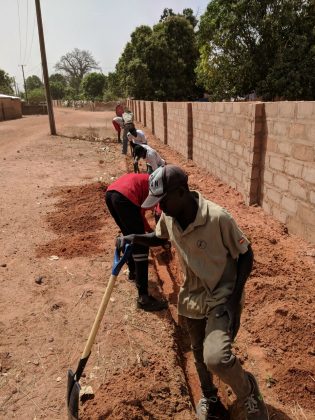 The lower basic school has all the local students pay 2 dalasis each term to use the water at the school. All of this money is recorded each month on paper, as well as on an Excel spreadsheet that belongs to the Water Committee Treasurer. Once everything is counted and recorded, the treasurer will travel to the city and deposit this money in the water committee bank account. The hope is that the money in the bank account can later be utilized to replace faulty parts, when needed, as well as later in the future to purchase a new tank if need be, or other maintenance equipment for the borehole. This “pay as you go” system initiated was put in place in the hope that this project will be sustainable for years to come.
The lower basic school has all the local students pay 2 dalasis each term to use the water at the school. All of this money is recorded each month on paper, as well as on an Excel spreadsheet that belongs to the Water Committee Treasurer. Once everything is counted and recorded, the treasurer will travel to the city and deposit this money in the water committee bank account. The hope is that the money in the bank account can later be utilized to replace faulty parts, when needed, as well as later in the future to purchase a new tank if need be, or other maintenance equipment for the borehole. This “pay as you go” system initiated was put in place in the hope that this project will be sustainable for years to come.
This water system has been consistently providing water to all 1,200 residents of Jarra Karantaba for now almost one year, and the effects have been tremendous. The locals of Jarra Karantaba were so jubilant about the successful implementation of this project that they organized a program within the village for the official grand opening of the borehole. The event took place on April 15th, 2018 where many notable dignitaries attended such as the former Vice President of The Gambia, the Peace Corps The Gambia Country Director and the governor of The Gambia’s Lower River Region, just to name a few. The local television broadcasting company, GRTS also attended the event to capture the enjoyment of the day, and to broadcast the new project to the rest of the citizens of The Gambia.
Still to this day, the electrified water pumps provided through the government are very inconsistent and none of the locals can predict if they will provide clean water. However, with the help of the Peace Corps and Water Charity, the locals of Jarra Karantaba can sleep well at night knowing that there will be clean water available for their families every morning for the immediate and foreseeable future.
We extend our thanks to Rehan for completing this important project.
